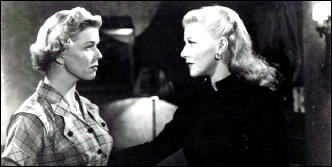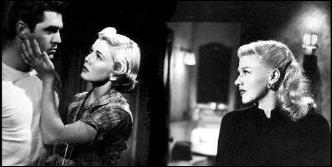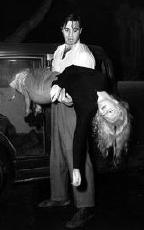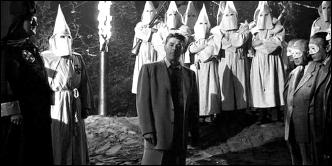Tue 22 Apr 2014
A Movie Review by Jonathan Lewis: STORM WARNING (1951).
Posted by Steve under Crime Films , Reviews[7] Comments
STORM WARNING. Warner Brothers, 1951. Ginger Rogers, Ronald Reagan, Doris Day, Steve Cochran, Hugh Sanders. Screenplay: Daniel Fuchs & Richard Brooks. Director: Stuart Heisler.

As much a cultural artifact as it is a film, Storm Warning (1951) is about a big city woman who witnesses a murder in a small town, the KKK’s stranglehold on otherwise decent people, and a county prosecutor’s determination to both solve a murder and to bring down the local Klan. Directed by Stuart Heisler (The Hurricane) and starring Ginger Rogers, Ronald Reagan, Doris Day, and Steve Cochran, the film is both a captivating tale of suspense and a cinematic jeremiad against the Klan’s role in the post-war South.
With a screenplay written by Richard Brooks (Elmer Gantry) and Daniel Fuchs (Criss Cross), Storm Warning is notable for its strong anti-Klan message, its bleak depiction of the mores of a particular slice of small town America, and its tragic, downbeat ending.
Indeed, shadowy black and white cinematography, a setting with dark streets, a neon-lit diner, and an abandoned bus terminal, and a brutal on screen murder, signal Storm Warning’s arrival as a film noir. After about forty minutes or so, however, the film morphs into a middling courtroom melodrama more suited for television than for the big screen. It then reverts to noir, albeit of an even darker shade, for film’s shockingly violent and tragic conclusion.

The plot’s basics are as follows. A bus is passing through the small southern town of Rockpoint. One of the passengers, a dress model named Marsha Mitchell (Ginger Rogers), has a sister in town. Since she hasn’t seen her sister in person for two years, she decides to get off the bus in hopes of catching up with her sibling, promising her traveling companion that she’ll catch up with him soon.
Something seems eerily wrong with the town. The guy who checks luggage at the bus terminal is in a hurry to close up, the local cab driver has no interest in driving his cab, and a diner is closing unusually early. Without a cab to take her to the recreation center where her sister works, Mitchell has to walk alone through the town’s dark, abandoned streets.
Soon Mitchell witnesses a scuffle outside the local jail. Klansmen are beating a print journalist, Walter Adams, who had been imprisoned on possibly trumped up charges after investigating the Klan. Mitchell witnesses the violence and tries to hide. Things go from bad to worse when one of the Klansman, his hood removed, shoots and kills the reporter.

Mitchell finally makes her way to her sister’s house. While catching up, she learns that her sister, Lucy Rice (Doris Day in an early non-singing role), is not only happily married, but also pregnant. Soon, her sister’s loser husband, Hank (Steve Cochran), comes home. Not only do we learn that he has an alcohol problem; he’s also the same guy who shot and killed the reporter.
Marsha Mitchell has an ethical dilemma. Does she admit that she knows what the husband did? Does she tell the authorities? What responsibility does she have to ensuring her sister’s happiness? What responsibility does she have to tell the truth? What would the consequences be of each possible choice? The movie deals with these very questions.
Tasked with solving the murder is the local district attorney, Burt Rainey (Ronald Reagan), who is well aware that many of his former high school classmates and neighbors are either in the Klan or are afraid to say anything negative about them.
Rainey is determined, however, to seek justice for Walter Adams. He doesn’t think much of the Klan, essentially viewing it as a corrupt racket. Eventually, Rainey learns that Marsha Mitchell had witnessed the crime and orders her to a coroner’s inquest. From there, the film takes several twists and turns, only to culminate in an especially noir ending that takes place at a chillingly realistic looking Klan rally out in the woods.

As I viewed Storm Warning, several things struck me. First, despite its clear anti-Klan message, there are no explicit references to the Klan’s racism. The viewer is supposed to understand what the Klan is and what it does. This is no Mississippi Burning.
More notable is the fact that the Klan is presented as a corrupt, fraudulent organization rather than as a vehicle for hate. There are also very few non-white faces in the film. Likewise, not a single character has a Southern accent. Finally, the film is notable for its almost complete lack of levity. Except for a moment in which Rainey’s mother notes that she didn’t vote for her son in his election for district attorney, but would do in the future, the film has almost no memorable humorous or happy moments.
Reagan succeeds in portraying Rainey as a lonesome warrior for good. Steve Cochran portrays Hank Rice as almost too stupid to be truly evil. The two female leads, Ginger Rogers and Doris Day, portray sisters who have completely different personalities. While Mitchell (Rogers) is guarded and cynical, Rice (Day) is ebullient and distressingly naïve.
Storm Warning is very dark, unhappy, and claustrophobic film. But it’s not one a viewer will soon forget. If you choose to watch it, the violence of last ten minutes or so will probably stay in your mind for some time to come. I’m pretty sure that’s what the screenwriters wanted.

April 22nd, 2014 at 2:45 pm
I saw this on its initial release and thought, more or less, what you write but, Doris Day’s part as written and played, is not credible — she cannot be Ginger’s sister. Or, can she? Reagan is excellent. I would vote for him at any time and for any office. And did. Storm Warning may not succeed on every dramatic and social front, but it comes close enough. And I do believe that on top of the racism, the KKK is as depicted. Stupid and corrupt. Cochran is fine.
April 22nd, 2014 at 4:16 pm
Good performances by Reagan and Cochran and surprisingly violent for its period. I haven’t seen this one in several years but I had the impression it was set in the Mid-West where the Klan was as active as it was in the South, but can’t recall if they explicitly say.
Brooks also wrote Crossfire a powerful anti racist film so I would be curious to know why the race angle was played down. But then Black Lightning the Humphrey Bogart film about a Klan like organization isn’t obviously set in the South either.
On top of the way she is written, Day is miscast in this. She never feels real in it through no fault of her own.
April 22nd, 2014 at 4:38 pm
Very true about Doris Day. She really was miscast in this. One really does wonder why her character would have married Rice and moved to this small town.
The film isn’t explicit about where it’s set. I bet this was deliberate, if not on the part on the screenwriters, then on the studio execs. It could be the lower Midwest (think: Indiana, southern Illinois, Kentucky), but there are also very subtle references to how “New York” and Northerners view the region. Mitchell is supposed to be a model from NYC. Perhaps a deliberate contrast? There’s also a reference, I believe, to “Savannah (Georgia?)” at one point.
April 23rd, 2014 at 2:52 pm
Yeah, the southern/racist connection was pedaled quite softly on this movie in order not to alienate certain movie-goers. The Klan appears–also soft-pedaled but in a distinctly anti-black gear, in 1950’s STARS IN MY CROWN.
Heisler’s films of this period have an odd, emotionally over-heated quality that makes them interesting if not always watchable.
April 27th, 2016 at 4:25 pm
Surprisingly the reviews above focus on Reagan and Cochran and to disparage Day (who I thought was OK in the part as written and directed), but nothing about Ginger Rogers who is the undoubted Star of the Movie and the central pivotal role. I thought she was pretty good, and believable and particularly sympathetic at the end, when she acknowledges her fear and intimidation but that she will speak up and defy the clan in spite of it.
June 25th, 2023 at 6:03 pm
1) No levity? Ronald Reagan’s comedic timing was impeccable: I laughed when he greeted the klansmen by their names, in spite of wearing their hoods!
2) Title makes no sense! There is no storm, let alone no warning for a storm!
3) This is NOT a noir film! Why is it listed as such genre?? It has none of its required elements!It has no femme fatale. It has no rainy pavement. It has no blinds casting shadows on protagonists, and it certainly has no anti hero who thinks he is a good guy yet isn’t, and doesn’t know that he isn’t! THOSE are the crucial “must have” elements to make a Noir! The detective (Reagan) isn’t wearing a fedora nor a trenchcoat (just a regular hat) and he doesn’t use “gumshoe” lingo! So I have no idea why this morning, it aired as part of TCM “Noir Saturday Mornings” show. Nobody said why!
June 25th, 2023 at 6:13 pm
Also Ginger Rogers character was HORRIBLE!!! The writing was stupid! She gives a killer her killer look. WTF?? Does she have a death wish? And for minutes and minutes and minutes she gives him the stink eye! How stupid is she? And he acts meek at first, and scared of her, only to turn and make a 180 and assault her? That made no sense, after he was scared of her.
Both characters are terribly written. Also there were no Black men lynched nor killed. The KKK only hurts Whites? (Kills a White man, never said why, then whips GR) Weird!
The only things they got right: Ginger Rogers and Doris Day playing sisters, since they were pretty much lookalikes (I used to confuse them, but Doris Day was the pretty one…until she got that stupid haircut in this film, and worse: her stupid bangs and bob later!)
However, GR’s character is despicable as can be and you can’t help but cheer when she gets a whooping; come to think about it: I can’t stand her! All her characters I’ve seen are despicable and she always played the same part… herself?! (The very worst is when she played a woman disguised as a 12 year old, UGH!)
Saving the best for last: the other thing they got right was casting Ronald Reagan. He was perfect for the part, what a great actor! But too little of him in this film! (PS: I know nothing of his politics! I know I should research it but irrelevant to my life, too much on my plate now, and not really interested, I just enjoy the actor in everything I’ve seen him in! My favorite of his is Desperate Journey, where he stole the movie from under Errol Flynn’s nose, LOL!)